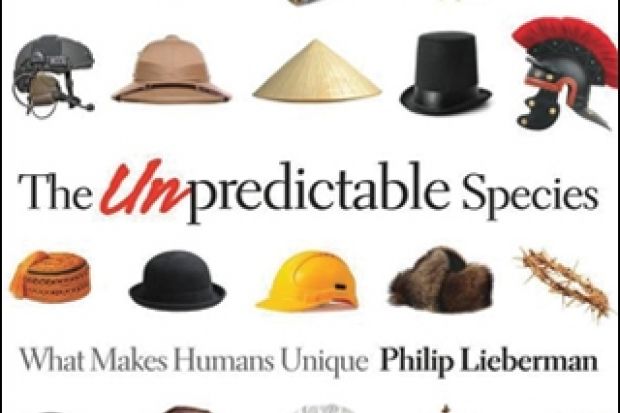The term “unpredictable” carries conflicting connotations. On the one hand, an unpredictable person or object can be understood to fall short of the expected standard; on the other, unpredictability is linked to originality, a prerequisite for creativity and human advancement. It is this latter sense of “unpredictable” to which Philip Lieberman refers here. Modern humans, he believes, evolved to be the “unpredictable species” owing to the enhanced creative capacities of their brains, which the author locates in the computational efficiency of brain circuits “involving cortex, basal ganglia, hippocampus, and other neural structures”. Crucially, he seeks to establish that the circuitry responsible for our cognitive flexibility is neither domain-specific nor uniquely human. For example, cortico-basal ganglionic circuits, whose impairment leads to language loss, are also involved in regulating motor control, associative learning and even emotion; the circuits “do not materially differ in monkeys and humans”.
This view of the mind sits in stark contrast to the so-called “massive modularity hypothesis”, according to which the mind/brain is not a general purpose computer but composed of a collection of cognitive modules that are specialised for particular functions, including language. Rejecting modularity entails two further consequences. First, if there are no neural structures uniquely dedicated to language, there can be no “language organ” or genetically determined faculty enabling its acquisition. Second, if the mind is not massively modular, one of the core tenets of evolutionary psychology, which sees human behaviour as based on innate psychological mechanisms that evolved via natural selection, is invalid, providing a reason to dismiss evolutionary psychology more generally. And so this book is to be read as taking a stand against both Noam Chomsky’s biological conception of language and evolutionary psychology, neither of which Lieberman sees as having contributed to our understanding of the nature and evolution of the human mind.
Instead, for Lieberman, language and behaviour are products of cultural evolution. Cultural evolution shapes the social and physical environment (the “human ecosystem”) in which natural selection operates, and thereby leads to genetic evolution. Lieberman thus appears to position himself within the realm of dual-inheritance theory, which views human characteristics as the product of gene-culture co-evolution, although he does not explicitly identify the affinity.
Much of the criticism levelled here against evolutionary psychologists and generative linguists is familiar (not least from Lieberman’s own writing), and much of it is well founded, even if judged to be “non-fatal” by theorists of the respective fields. For example, in evolutionary psychology, caution should indeed be exercised to avoid “over-zealous adaptationism” resulting in unfalsifiable “just-so stories” that link our behavioural traits to an unknown evolutionary past. Similarly, evidence has been amassing that Broca’s area (in the lower portion of the left frontal lobe) is not the centre for syntactic computation that it was once assumed to be, which calls into question the argument that language functions are amenable to “simple” localisation. In the absence of a good understanding of how neural activation patterns are to be interpreted, Lieberman’s warning that “our knowledge of how brains work is imperfect” is a judicious comment on the dangers of unbridled enthusiasm for neuroimaging data in linguistic research.
What is irksome about this book is that it does not extend the same rigour of analysis to arguments that tally more closely with Lieberman’s sympathies. Worse, he blatantly misrepresents concepts and tenets of rival theories, as, for example, when he claims that Chomsky assumes language acquisition to proceed “without tedious processes such as associative learning, imitation or any form of learning” - a view with which generativist linguists will fail to identify, given the acknowledged role of learning mechanisms in lexical acquisition. And Lieberman’s claim - for which no coherent argument is provided - that the proposal by evolutionary psychologist Marc Hauser that we are endowed with a universal moral grammar “provides a free pass for genocide” and “licenses any mode of conduct” is downright outrageous. Finally, the belligerent, polemical tone that characterises much of this text unnecessarily flattens debates that are complex and nuanced. The overall result is a book that is predictable in its conclusions, and manages to be unpredictable only in the irritation it causes.
The Unpredictable Species: What Makes Humans Unique
By Philip Lieberman
Princeton University Press, 2pp, £19.95
ISBN 9780691148588 and 9781400846702 (e-book)
Published 21 April 2013




